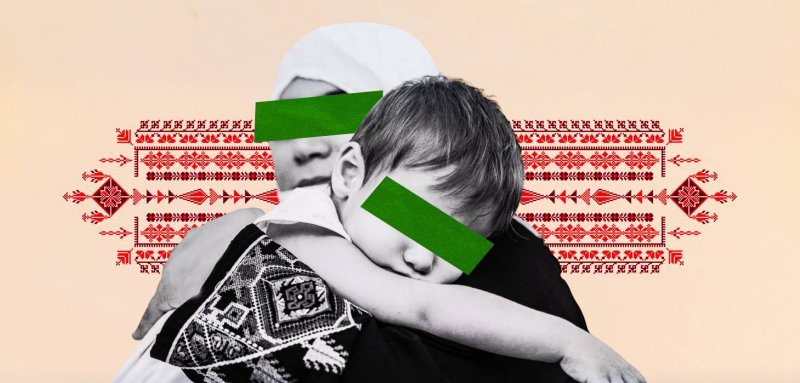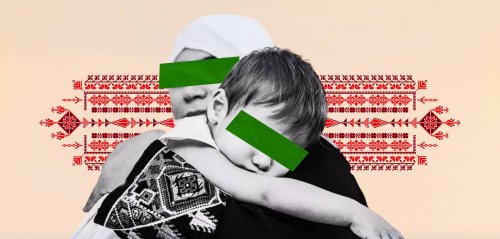Every time my son smiles, just a few days old, in his small cradle in Upper Galilee, I find comfort in believing that he sees his father's distant smile. Unfortunately, due to Israel's discriminatory policies towards anything Palestinian, his father is unable to be with him physically. Before I can fully embrace this notion, my mother comes to tell me about various beliefs, like how when a child smiles at this age, it means he sees angels watching over him, caring and loving him until he begins to distinguish sounds, colors, and shapes around him. However, in my rich imagination, I like to imagine my son seeing his father's beautiful smile and feeling the gentle touch of his hand on his head and body.
Throughout the entire nine months of my pregnancy, during which I remained apart from my Palestinian husband, who was denied entry to the country solely because of his Palestinian ID, I endured great hardship. Each day of my pregnancy, I feared I wouldn't make it, that I couldn't cope with carrying a baby in my belly while his father was so far away. I knew I would never be able to explain to him that I only saw his father for a few days, when I traveled while heavily pregnant just so my husband could feel our baby's movements in my belly, just so he could form a vivid and real memory of the days when his son grew up far from him, and so that, later on, we could recount the tale to little Ghassan, who came to the world with a splintered identity, born to a mother from Galilee and a father from Gaza, and how migration, exile, and alienation were the only way for them to be together.
Under the extreme far-right government that rules Israel today, governmental transactions did not make my pregnancy any easier. After registering my marriage in government offices, the employee at the ministry confidently informed me that the government would never grant my husband family reunification because he is from Gaza. "I mean, if he were from the West Bank, it would have been possible," she said. With that sentence, she underscored the distinctions that Israel has planted and instilled in the three different Palestinian communities.
Every time my son smiles, just a few days old, in his small cradle in Upper Galilee, I find comfort in believing he is seeing his father's smile, who's unable to physically be with him due to Israel's discriminatory policies towards anything Palestinian
It didn't end there; she further complicated matters when she inquired about proving the identity of the father, and what guarantees them that my husband is the child's father, "We do not recognize marriages outside of Israel, and your marriage certificate hasn't even been valid for a year. Your husband cannot come and testify that he is the father." Each time I thought I had encountered the ugliest aspects of this place and confronted them with all my strength, I realized there was still much I didn't known.
Estrangement at home
Numerous female friends of mine, upon learning of my pregnancy at the close of 2022, emphasized that being beside the mother during pregnancy and the first months of childbirth holds far greater significance than being by the husband's side. My friends were trying to ease the sadness and misery that had swept over me the instant I found out about my pregnancy – a time when I couldn't hold my husband and share the joy with him. I have always imagined this moment in my mind since we got married, despite the notion of parenthood being distant during the early stages of our marriage. I had envisioned him entering our home, and me sharing the news, us shedding tears and celebrating together, then the two of us visiting the doctor, seeing the image of the fetus on the ultrasound, and hearing the sound of its heartbeat for the first time, hand in hand. However, none of this happened. I embarked on this journey alone throughout the subsequent months, from Rambam Hospital in Haifa to clinics in Akka and Majd Al-Krum, and finally giving birth in Nazareth, as I told my son Ghassan inside my womb that we'd soon be reunited with Baba, and that politics wouldn't succeed in separating the love and family we had worked so hard for.
The walls closed in on me during the early months. While postpartum depression is frequently discussed in studies and awareness campaigns, they rarely address pregnancy depression (prenatal depression) enough, an affliction often remains in the shadows, along with its psychological repercussions on both mother and fetus. Throughout those months, I was unable to work. Getting out of bed in the morning was torture, staying in the bathroom all day due to vomiting, not tasting food, not desiring coffee or sweets, and constantly thinking about the end of the pregnancy. Would I be able to love my son the way other women talk about their love for their children?
My room turned into a terrifying nightmare during the pregnancy months – he room I had longed for all my life, a large library covering the wall, my books arranged according to my various readings, a small closet shared by me and my sister, furniture in white, and lighting in white, making the atmosphere resemble the rooms I always shared with my friends on social media. But suddenly, it became repugnant to me, I didn't like its smell, I cleaned it constantly, and I longed to escape from it into the arms of my dear husband Kareem, to a small, quaint house in chilly Europe.
When Ghassan arrived, and he was placed on my abdomen and then on my chest, I felt the warmth of his body outside of mine, and his scent resembling a field of flowers, and the softness of his small body, I trembled for hours. I didn't cry and I couldn't let them take him from my hands, I watched my sister standing beside me as she cried and cried, just like my mother, as for me, I was shocked by the sudden overflow of love from within me, and the desire for life that returned to me after long months of desiring to vanish and disappear forever, so that no one would see me or know me, and I was left with an overpowering desire to embrace life anew.
Soon, we'll be reunited, and in the evening we'll talk about daily trivial things. We'll listen to music together, write and read out loud, hold the hand of our little son, and walk away from the military checkpoints and F-16 planes and security restrictions
Bedtime stories
Each night, I recount a bedtime story to myself, one that portrays a happy family living a normal life, without questions about identity, meeting places, and the many roadblocks in the way, a house where the sun enters in the morning and love does in the evening, with a dog sitting on a chair in the garden watching migrating birds in the fall, and a child growing up and playing in the living room, not wanting to sleep early to go to school.
I tell this story every day to my little son in his crib. I tell him about the many planes we'll have to board to meet his grandparents, about the checkpoints and policies that will prevent his father from coming with us to the country, and about the politics and obstacles that will prevent me from being his companion alongside his father when visiting his family. Perhaps, as he grows older, questions won't plague him as they do us, and he won't lose his way along the journey.
I count the days every day, placing an "X" on the days that pass in the calendar. I say, "Months have passed, a year has passed, we'll be reunited soon, and in the evening, we'll recount our daily experiences. We'll talk about trivial things, listen to music together, write and read out loud. We'll stroll in the evening as a gentle rain falls, holding the hand of our little son, walking a path far from military checkpoints and F-16 planes and security restrictions.
* The views and opinions expressed in this article are those of the author’s and do not necessarily reflect the official policy or position of Raseef22
Raseef22 is a not for profit entity. Our focus is on quality journalism. Every contribution to the NasRaseef membership goes directly towards journalism production. We stand independent, not accepting corporate sponsorships, sponsored content or political funding.
Support our mission to keep Raseef22 available to all readers by clicking here!
Interested in writing with us? Check our pitch process here!






